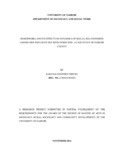| dc.description.abstract | Actual and attempted acts of homosexuality are criminalized under Kenyan laws. The
punishment for such acts is set out in Sections 162 and 165 of Laws of Kenya. In addition,
homophobia is widespread in the country, with a Kenya Human Rights Commission study in
2011 finding out that 86 percent of Kenyans are against homosexuality. However, in spite of
the criminalized nature of homosexuality, it still persists in the country. The existence of
these individuals in has attracted the attention of scholars, policymakers, and other
stakeholders. The current study sought to examine how internalized homophobia affects
sexual relationships among this group. The major objective of this study was to identify the
relationship between internalized homophobia and dynamics of romantic relationships among
men who have sex with other men in Nairobi. Specifically, the study sought to analyze how
internalized homophobia affects the duration of relationships among this group. It also sought
to identify how it impacts on the frequency of these relationships, its link to risky sexual
behavior, and how it relates to relationship status among MSMs. The study assumed a
quantitative and qualitative approach. Quantitative data was collected using a questionnaire
and an attitude measurement tool. Qualitative data was collected using key informant
interviews and literature review. A background information questionnaire was used to collect
information pertaining to the respondent’s background and attributes about their
relationships. Nungesser Homosexuality Attitudes Inventory was used to measure levels of
these attitudes among the respondents. A sample size of 60 adult gay men who are currently
in a romantic relationship with a gay man or have been in such a relationship was used. The
60 respondents were accessed through non-random and snow-ball sampling methods.
Quantitative data was analyzed using SPSS. Interviews were conducted on 6 key informants
in the gay community in Nairobi. The informants were accessed through purposive sampling.
Information from the interviews was analyzed through thematic analysis. The study found
that internalized homophobia is widespread among MSMs in Nairobi (46.7% were found to
have high levels of internalized homophobia, while 30% reported moderate levels). In
addition, it was found that internalized homophobia has various impacts on the dynamics of
relationships among men who have sex with other men. It affects the duration of relationships
(chi test value=59.40, p=0.003), relationship status (38.2% of respondents currently in a
relationship, and 61.8% not in a relationship), and risky sexual behaviors (chi test
value=71.771, p=0.006 with regards to number of men respondents have had sex with within
the last 6 months). Based on the findings made in this study and from the literature review, it
is recommended that the government and other stakeholders should come up with policies
aimed at improving the welfare of MSMs. Such policies include training of healthcare
providers on how to handle this group, establishment of mental healthcare facilities and
frameworks targeted at this group, and expanding the freedom of this minority group under
the new constitution. Researchers should also consider diversifying their focus on men who
have sex with other men from HIV to social and other aspects of this group. They should also
try to overcome the prejudices and challenges associated with such studies. In addition, the
researchers should prepare their families and significant others about their participation in
studies involving men who have sex with other men. Learning institutions and other
stakeholders should encourage and support studies on this group. Finally, men who have sex
with other men groups should take a proactive role in encouraging studies in this field. The
aim is to come up with scientific data to demystify the existence of MSMs in contemporary
Kenyan society. | en_US |



